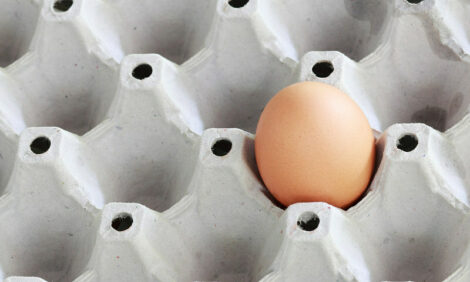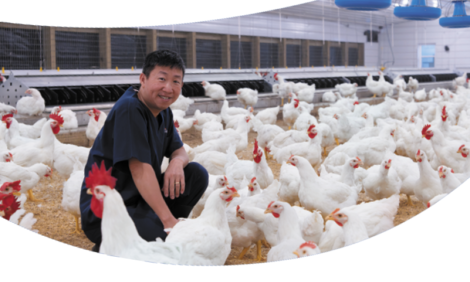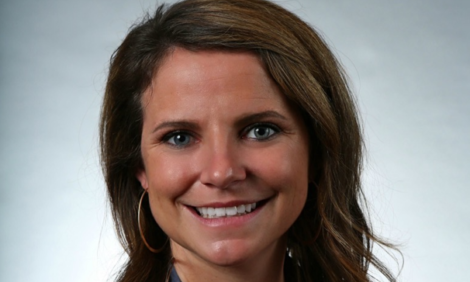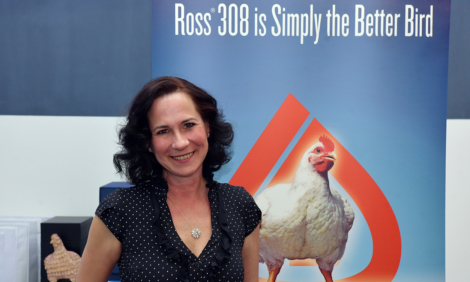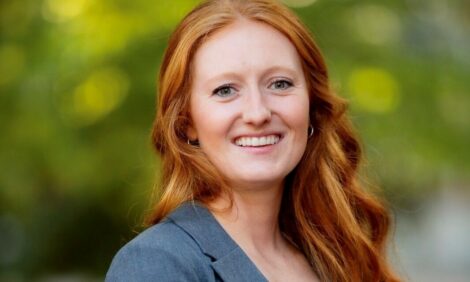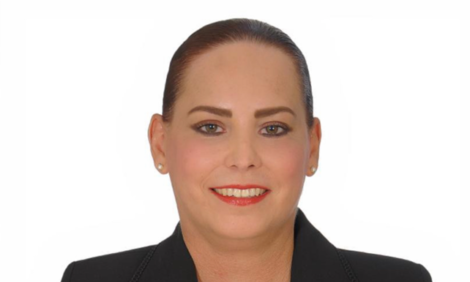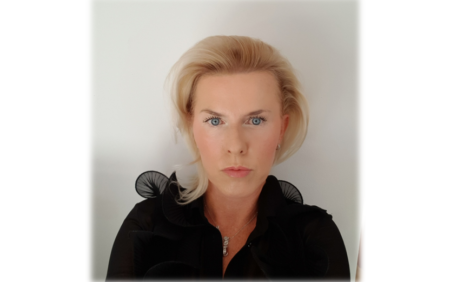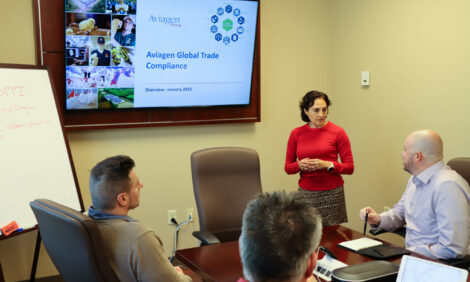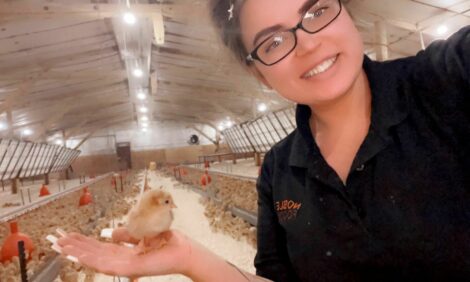



Women in Poultry – Dané van den Heever
Learn more about Dané van den Heever with Noble FoodsDané van den Heever works for Noble Foods in the UK as an Assistant Farm Manager. She received her bachelor’s degree in Agriculture from the University of the Free State in South Africa, majoring in Animal Science and Animal Nutrition. Prior to working with Noble Foods, she worked as a researcher at Clinvet in South Africa. In her current role, she is responsible for pullet rearing for a 150,000 birds across three locations.
Describe a typical day in your current role?
There are six poultry houses on our farm and we work across two other farms too which keeps me pretty busy day-to-day. A typical day for me quite literally means playing "mother hen"!
We take 1-day old chicks and rear them up to 16 weeks old when they are ready to be transported to laying farms. Raising them to hens involves doing everything I can to look after the chicks on the farm, including monitoring their water consumption, temperature of the houses, ensuring they have feed, giving vaccinations and weighing them once a week. In addition to working with the actual chickens, a very large part of my job involves the daily running of the farm to make sure everything is running smoothly and to the standards set out by regulatory bodies. Examples of this include maintenance of equipment, pest control recording and interpreting data from day-to-day operations to make sure the chicks are performing optimally (growth rates, for example). We can have up to 150,000 chickens on our farm at one time, so although there are set responsibilities each day, there are always new challenges too.
What’s unique about your role?
Pullet rearing is unique because it goes against many of the pre-conceptions people have about farming – and that’s exactly what I love about it! Often people think of farming and immediately think heavy lifting and big machinery. The core skills involved in pullet rearing, however, don’t necessarily require you to be physically strong or active – instead, it’s about being nurturing and caring. The chickens are totally dependent on you and that means you’re a bit like a parent to them. It’s a really nice feeling getting to watch them grow and to know you’ve played a part in their wellbeing. In fact, I often find it quite therapeutic just spending time with them. I think many people would be surprised to hear the word ‘therapeutic’ used in farming.
What are the main challenges that you face in your role?
My husband and I emigrated to England from South Africa just over a year ago, and this meant not only getting to grips with a new role but also a whole new country and local way of doing things. Although I am fluent in English, it isn’t my first language, so sometimes things just get lost in translation and I have to work around this. Another big difference I had to come to terms with when arriving in the UK was how much individual responsibility each person had due to staff shortages, whereas in South Africa there were always more people looking for work than jobs available.
I am grateful to be part of a bigger family at Noble Foods, who have supported me as I adjust to my new lifestyle and provided me with opportunities to learn and grow my career in poultry.
What does the future of poultry health look like in terms of preventing and treating disease?
In recent times, we are more aware of the importance of preventing and treating diseases in animal populations, and I hope this means there will be lots of exciting developments in the future. Over the next decade, I expect there to be a lot of research in this area, with a focus on developing new technologies and innovations. During the pandemic, scientists came to terms with how much more focus should be put on prevention of disease rather than a cure. This is also true in the poultry industry. This would also be much more beneficial to human health and greener agriculture as a whole. This should allow for better diagnostic tools to identify infectious diseases early on, as well as new vaccine production technologies to reduce the cost of vaccines, ensure better efficacy and allow easy and rapid intervention. Research into genetics of chickens could also be a good natural way to breed chickens that are genetically protected against prevalent disease.
Working with Noble Foods means we’re lucky to have great biosecurity on our farms. They provide lots of online training, health and safety and regular farm audits to help us stay on top of this and support us in our day-to-day pullet rearing tasks. It’s nice to feel connected to them and know we are not alone if we need extra support. For me in particular, this has been key when moving to a new role and country.
Are there individuals or organizations in poultry who you’ve found particularly inspirational?
I would say it all started early on in life with my parents who taught me the basics of farming as well as later on at university where I was inspired to develop my interested by a university professor Dr. F.H. de Witt, who was our lecturer in poultry nutrition. Now working in the industry, I am inspired by our regional manager Alan Durham, who is extremely experienced in the industry and has provided guidance and is passing on his knowledge to me. In my opinion, everyone I work with inspires me and contributes in a small but impactful way. I think it is important to have someone to look up to at whatever stage you are at in your career or life.
Have you encountered any challenges as a woman in your field? If yes, how have you overcome them?
Farming is traditionally a male dominated industry, with women making up just a quarter (28%) of the British agricultural workforce, which means it can feel like you sometimes stick out as a woman in the field. For me, the biggest challenge has been that people often think I need more help simply because I’m female. I think this is because women are often perceived as being “too weak” to be good farmers, which of course isn’t the case!
To overcome these types of challenges, I’m working hard to try and change people’s mindsets about farming. This is essential if we want to encourage new talent and protect the future of our industry. There are lots of ways we can do this but one of the easiest is just by talking more openly about the lack of diversity in farming and promoting all the different roles which exist – particularly the ones like pullet rearing which many people haven’t ever heard of and reveal a side to farming that people might not expect.
What outstanding challenges facing the poultry industry would you most like to solve?
I grew up on a farm in the Free State Province of South Africa, and from a young age I have always had a love for farming, especially poultry farming. It saddens me that many other young people don’t get the same opportunity to see how great farming is - either because they are never exposed to it or don’t see it as a viable career option because of the stereotypes that exist. Recent research shows that over a third of all farm holders in the UK are over the age of 65 and just 3% of holders were aged less than 35. Therefore, the biggest industry challenge I’d like to solve is to shift young people’s mindsets and help them understand why farming is such a great career choice. I think a big part of this is providing more entry-level opportunities and vocational courses targeted at the next generation.
What’s the most exciting innovation that you see on the horizon for the poultry industry?
I think it’s hard to name just one! What I’m most excited about generally though is the introduction of new technologies and methods which will help to combine human knowledge and expertise in order to make poultry farming, a very traditional and hands-on industry, more efficient and productive. For example, I’ve heard about new 3D cameras which measure the shape and volume of broilers and record high precision weight estimates to monitor bird health and welfare. Similarly, automated chicken feeders work by using a sensor to detect when the chickens are near and then dispensing food for them to eat. I think innovations like these will help to automate some of the more repetitive, time-consuming jobs so that people like me have more time to focus on the bigger picture things which will drive our sector forward – for example, things like sustainability and monitoring welfare and standards. In the poultry industry, the devil is in the detail and very small changes can make very large differences in production margins. My hope is to develop more ways to determine small changes and minimise variables for better production and overall health of the birds.
What are you most excited about in the next 5-10 years regarding the poultry industry?
I’m most excited about the opportunities that come with working in the poultry industry, particularly now I’m part of a bigger organisation which means more opportunities to upskill and learn from others. While labour shortages are a current challenge for our industry, it means there is a renewed focus on training and skills which I’m pleased to see the British Poultry Council is taking an active lead in supporting. I hope this will help to encourage new talent into the industry, as well as provide increasing opportunities for existing poultry workers like me to grow our knowledge and expertise. The poultry industry is a very rewarding sector and if more young people realise how rewarding and challenging it really is, we would see more and more young people interested.
What’s your next challenge?
My next challenge I would say is to learn even more about the broader poultry industry, including ration formulations and new technologies we can incorporate into our farm. The more a person learns about poultry, the more questions they have and questions lead to more innovation.








